Trimdon Colliery Plasterers: Whenever you're engaged in refurbishments or improvements on your house in Trimdon Colliery it's almost certain that you will either have to get some affected plaster walls repaired or fresh plaster administered. Now plastering is a skillful trade and while you are perhaps fairly useful at odd jobs, it isn't something that you ought to try to do yourself, except if you have extreme confidence in your abilities. This is even more crucial if ceilings have to be skimmed, because you will almost certainly get yourself and your house in quite a state if you should try this. You would be wise to call in a qualified plasterer to tackle this work, and while you should not have any trouble uncovering a plasterer in Trimdon Colliery, securing one that has the free time to accommodate your project could be more tricky. Plasterers, as with a lot of tradespeople, are generally in demand, thus if possible try and book someone in several weeks before.
A lot of home renovation projects will require some plastering work to be carried out, even modest jobs. Usually it will be skimming a partition, installing mouldings or coving before decorating, plastering over artex or screeding. Do not imagine however that those are the only plastering jobs which might be required, because there are many more possibilities.
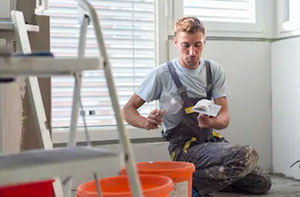
Before any work begins you need to check out prospective Trimdon Colliery plasterers to make sure that they really know their stuff. Ask to see some photos or a portfolio of completed projects. Without exceptions, you need to avoid hiring "cowboys" for work of this kind. Even poor quality plastering can sometimes look passable at first, but later on, the complications begin.
The moment a coat or two of paint goes on a newly plastered wall, you'll soon notice any defects. This impression is even more emphasized when the uneven areas are viewed in bright daylight. So, be sure to only consider competent plasterers in Trimdon Colliery.
Being flat and smooth is the most important attribute of plastered surfaces, since they're simply a base product onto which other materials are subsequently applied. It is very simple to fill and sand down any little imperfections and cracking, but it's difficult to conceal inherently irregular surfaces. Areas that are unevenly plastered can cause problems with kitchen or bathroom tiling, the painting and wallpapering of walls and ceilings, the accurate fitting of architraves and the installation of kitchen units.

You should expect nothing less than a polished finish straight from the trowel. A brief rub down before decorating is all that a plastered ceiling or wall should require, it shouldn't ever require sanding. You'd be correct in thinking that the plastering hasn't been done to a competent level if too much sanding is required. You should check the standard of the plastering thoroughly, if you see electric sanders being used.
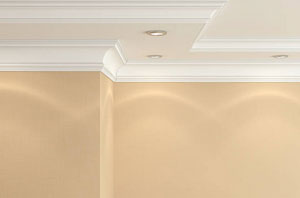
One common reason for calling in a plasterer in recent times, is to plaster over an artex ceiling. At the height of its popularity throughout the 1970's and 1980's, artex is out of favour in Trimdon Colliery properties today. Most plasterers in Trimdon Colliery will gladly plaster over that artexed ceiling, making it look more fresh and modern. If however, you want to bring a bit of that old style back into your home, most plasterers will be just as glad to coat your ceiling with artex as they are to cover it up.
DIY Plastering Trimdon Colliery: Although when you have plastering work which needs to be carried out in your home in Trimdon Colliery, it's better to hire a reputable plasterer to do the job, it's still quite possible to have a go on your own, if you have self-belief and are reasonable at do-it-yourself. Practicing on an out-of-sight area or a spare bedroom is definitely a wise idea when you're starting your initial plastering adventure. Whenever possible try to practice on an area that already has a poor quality plastered finish, so that your amateurish efforts can't make it much worse. This is likely to be less stressful for you, and enable you to spend some time mastering your newly found skills. It is possible to re-skim a wall surface as many times as you want to a certain degree, and you can very easily have another crack if you don't do a great job the first time around.
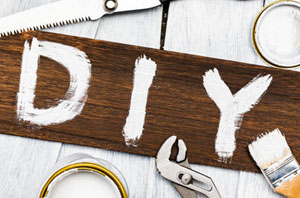
If you do not wish to go to the extreme length of signing up for a proper plastering course, you will be able to get some really good tips and hints by viewing You Tube tutorials, although of course it isn't always quite as easy as it's made to look in those videos. Plastering is of course "hands on" activity and the more you practice the more capable you get. You could even come up with some of your own techniques for getting a flawless finish, however the tried and proven ways are normally the best. Because plastering is all about confidence, the more you do it, the more confident you'll become. You can attempt some more elaborate plastering tasks as soon as you have mastered this art to a decent level. If you make a mess of it, you still have the option of bringing in a reputable Trimdon Colliery plasterer to put things right.
Screeding Trimdon Colliery
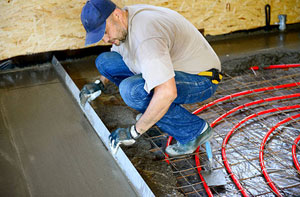
Screeding is a process through which a new level floor surface is produced by using a sand and cement mix. The application of screeding is mostly carried out over a previously laid concrete sub-floor to be left as a wearing floor surface, to encase underfloor heating pipes or to take on the final floor finish. Enhanced quality, durability and finish is the consequence of a correctly laid screed. Screed is only mixed by hand where small areas of floor are involved. For more substantial areas, a good screed pump must be used to ensure a smooth and even mix of sand, cement and water, which can then be pumped directly to the required location. There are different kinds of floor screeding available in Trimdon Colliery, therefore you need to enquire about which is suitable for your particular project, you'll need to choose from structural screed, floor levelling compound, fast drying screed, free-flowing screed, traditional screed, bonded screed and unbonded screed.
Trimdon Colliery Plaster Patching
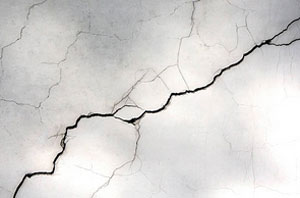
Plaster Patching Trimdon Colliery: If you've fairly recently had some construction work carried out on your house in Trimdon Colliery, or if you live in an older Trimdon Colliery property, it's possible you'll have cracked or ruined plaster that needs to be patched up. So that it can be properly decorated and kept looking tidy, your plasterwork ought to be kept in good condition at all times. There is little worse than seeing cracked plasterwork, or sections that are untidy or unprofessionally patched up with Polyfilla. So that you can finish your painting and decorating and get your plaster walls looking in perfect condition once more, you need to call in a decent Trimdon Colliery plasterer who will have your walls looking good again in double quick time. Different factors could cause issues with your plaster finish shrinking, damp, accidental damage, settlement and vibration. Prior to doing any patching up it's vital to resolve any underlying problems, because damage will almost certainly reoccur if they're not taken care of beforehand.
A Plasterer's Tools
When plastering work needs doing in Trimdon Colliery, most tradespeople and do-it-yourselfers will discover that they do not have all the specialist tools that are needed to do a proper job. Which is why in most cases a skilled plasterer will be needed for this type of work. The following are merely some of the tools that a certified plasterer will work with:
- Plasterboard Carrier
- Plaster Pan & Buckets
- Plasterer's Hawk
- Dry Lining Rasp
- Feather Edge
- Edging Trowel
- Plasterer's Trowel
- Corner Trowel
- Plastering Rule
- Plaster Mixing Paddle
- Taping Knife
- Finishing Trowel
Plaster Trimdon Colliery
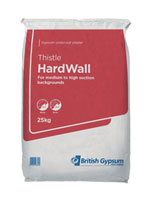
Employed for decorating and protecting ceilings and walls in buildings, plaster is a material that's been in use since the days of the ancient Egyptians. What most of us call "plaster" in the British Isles is normally thought of as the material which is used for coating the internal rooms of buildings and houses, whilst that which is used externally is known as "render" or "rendering". The most commonplace types of plaster generally contain either gypsum, cement, or lime, but all pretty much work in the same way. Blended with water to create a stiff but easy to work paste, plaster is simply a dry powder when it is manufactured. A reaction is induced when the plaster and water are mixed together, and hardening takes place as a result of the heat generated through a process called crystallization.
Plastering Courses Trimdon Colliery

If you would like to kick start a career in the plastering trade or merely desire to acquire some basic skills in plastering you could think about taking an appropriate course of some kind. There are an array of plastering related courses offered for both beginners and tradesmen looking to increase their plastering expertise. Both NVQ or City and Guilds level courses are available for both intermediate and beginner plasterers. Beginners courses (level one) tackle stuff like putting on set coats, readying background surfaces, installing sheet materials, mixing plaster materials, putting on floating coats and putting on scratch coats. Intermediate and advanced (level two courses and diplomas) cover things like fibrous plasterwork, plastering to external surfaces, dry lining, reverse moulds for fibrous plasterwork and cement and sand screeding. To discover more on available plastering courses in Trimdon Colliery and nearby, search on Yahoo or Google. You can learn a little more about City and Guilds plastering courses by clicking here.
Polished Plaster Trimdon Colliery
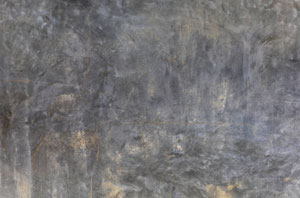
Polished plaster is a typical name for the finish of certain plasters and for the description of new types of old fashioned Italian plaster finishes. The name "Polished Plaster" is actually used to cover a wide assortment of good quality plaster finishes, from rugged textured plasters to highly polished Marmorino, Venetian and Lucidato plasters. Offering a finished surface that looks much like travertine, limestone or marble, polished plaster is mostly used on interior ceilings and walls. It provides a sense of depth by using natural variations in shade while being smooth to the touch. Unique custom finishes can be created by mixing up these various kinds of plasters. Polished plaster can be coloured or dyed by using natural or artificial colourants. This is particularly handy when trying to accomplish "marbled" effects or to generate colours and designs that don't exist in nature. To read more about polished plaster, visit Wikipedia (here).
Artex

Although artex isn't really so popular nowadays as it was in the 1970's and 1980's it's still an excellent way to enhance the look of a cracked or uneven ceiling. It is not quite as simple to track down a plasterer who will tackle artexing nowadays, whereby in the past there were lots of tradesmen who did nothing but artex and artex repairs. The thing that raised its attractiveness was probably the wide variety of styles and designs it could be fashioned in, and it appeared that everybody had their preferred style, maybe it might have been stipple, broken leather, swirl, hook & line, bark, circles, basket weave, criss-cross, pairs, medusa or scroll. There was an artex pattern that was suitable, no matter what your taste. All of these artex styles can still be carried out today if you're able to find an artexer of plumber willing to do it. Try to avoid handyman types who offer to "have a bash". That being said, it should be mentioned that artex is rather tricky to repair or patch and it is probably because of this that its use waned. (Tags: Artex Removal Trimdon Colliery, Artex Trimdon Colliery, Artex Patching Trimdon Colliery, Artex Repairs Trimdon Colliery, Artexing Trimdon Colliery)
Plasterer Trimdon Colliery
A tradesman who works solely with plaster, a plasterer in Trimdon Colliery is a professional who spreads a smooth coating of mixed plaster over previously coarse and unglazed surfaces, which can then be decorated. Plastering as a trade has been in existence for hundreds of years, whilst the technique in general has been used in the repair and finishing of structures for millennia. Plaster in today's world, is predominantly used on the inside of the outside walls of commercial and domestic buildings, to generate a smooth, even surface on which to apply the final finish. Plaster can also be employed to make decorative mouldings which can be used to embellish ceilings and walls. Plastering also plays a vital role in lots of home remodelling projects in Trimdon Colliery, and is often used in the construction of porches, garages, loft conversions, extensions and more.
Information, Help and Social Media

To acquire more information regarding the tools of the trade, interior plastering, external plastering, the history of plastering and plaster, traditional plastering methods and plasterer's tasks, you could take a look at Wikipedia and search for "Plasterwork". To discover fully accredited members of the Federation of Plastering and Drywall Contractors (FPDC) you can do a search HERE. To ask questions related to rendering, screeding and plastering visit a plastering forum. Discussion topics comprise External Wall Insulation, Plastering Students Discussions, Floor Screeding, General Trade Discussions, Magnetic Plaster, Fibrous Plastering, Tips and Tricks of the Trade, Rendering, Plasterer's Health and Wellbeing and Damp Proofing. (Tags: Plasterers Trimdon Colliery, Plastering Trimdon Colliery, Plasterers County Durham, Plasterer Trimdon Colliery).
Plastering Tasks Trimdon Colliery

Trimdon Colliery plastering specialists will likely help with professional plasterers Trimdon Colliery, the rendering of concrete blocks, monocouche rendering Trimdon Colliery, false ceilings in Trimdon Colliery, the fixing of coving, dot and dab walling, interior screeding and rendering, plastering over artex in Trimdon Colliery, skimming over existing plaster surfaces, Marmorino plaster, artexing on plasterboard, asbestos testing in Trimdon Colliery, fibrous plastering, dry lining and plastering ceilings, pebble dash repairs Trimdon Colliery, drop ceilings in Trimdon Colliery, plaster removal, lath and plaster walls, skirting board installation Trimdon Colliery, wall crack repairs in Trimdon Colliery, coloured K Rend, screeding floors for tiling, Venetian polish plastering in Trimdon Colliery, quotes for plastering and rendering in Trimdon Colliery, skimming plaster ceilings and walls, drywall plastering and skimming, wet dashing, lay in grid suspended ceilings, float and set plastering, metal studding partitions in Trimdon Colliery and other plastering work in Trimdon Colliery, County Durham.
Trimdon Colliery Plastering Services
- Trimdon Colliery Stud Partitioning
- Trimdon Colliery Plastering Estimates
- Trimdon Colliery Plaster Repairs
- Trimdon Colliery Plasterer
- Trimdon Colliery Soundproofing
- Trimdon Colliery Artex Covering
- Trimdon Colliery Plastering Courses
- Trimdon Colliery Plaster Skimming
- Trimdon Colliery Dry Lining
- Trimdon Colliery Artexing
- Trimdon Colliery Plasterers
- Trimdon Colliery Ceiling Replacements
- Trimdon Colliery Domestic Plastering
- Trimdon Colliery Coving Installation
Other Useful Trades in Trimdon Colliery County Durham

Naturally, whenever you are doing home improvements in Trimdon Colliery, County Durham, you will likely be in need of all kinds of different tradesmen and apart from plasterers in Trimdon Colliery, County Durham, you could also need domestic cleaners in Trimdon Colliery, bricklayers in Trimdon Colliery, waste clearance in Trimdon Colliery, plasterboarders in Trimdon Colliery, carpenters in Trimdon Colliery, electrical re-wiring in Trimdon Colliery, building contactors in Trimdon Colliery, plaster mouldings in Trimdon Colliery, external wall insulation in Trimdon Colliery, coving installers in Trimdon Colliery, rendering specialists in Trimdon Colliery, wall tiling in Trimdon Colliery, pebble dashers in Trimdon Colliery, artexers in Trimdon Colliery, polished plaster in Trimdon Colliery, dry lining services in Trimdon Colliery, screeding specialists in Trimdon Colliery or painters in Trimdon Colliery.
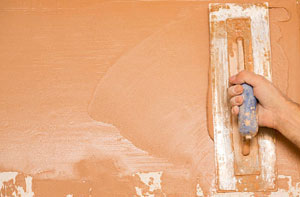 Plasterers Trimdon Colliery
Plasterers Trimdon Colliery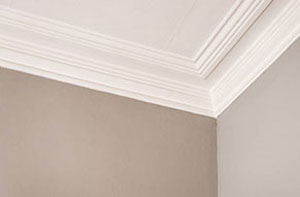 Plastering Near Me
Plastering Near Me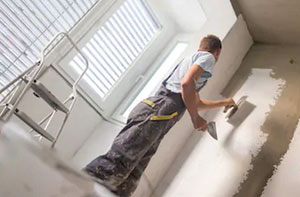 Plasterer Trimdon Colliery
Plasterer Trimdon CollieryPlastering Jobs Trimdon Colliery: Browse plastering jobs in Trimdon Colliery here: Plastering Jobs Trimdon Colliery
More County Durham plasterers: Consett Plasterers, Hartlepool Plasterers, Spennymoor Plasterers, Ferryhill Plasterers, Shildon Plasterers, Chester-le-Street Plasterers, Yarm Plasterers, Peterlee Plasterers, Seaham Plasterers, Brandon Plasterers, Horden Plasterers, Stockton-on-Tees Plasterers, Murton Plasterers, Darlington Plasterers, Newton Aycliffe Plasterers, Billingham Plasterers, Eaglescliffe Plasterers, Stanley Plasterers, Durham Plasterers and Bishop Auckland Plasterers.
TOP - Plasterer Trimdon Colliery
Plastering Trimdon Colliery - Decorative Plastering Trimdon Colliery - Cheap Plasterer Trimdon Colliery - Plasterers Trimdon Colliery - Screeding Trimdon Colliery - Plasterboarding Trimdon Colliery - Plaster Skimming Trimdon Colliery - Coving Trimdon Colliery - Rendering Trimdon Colliery





